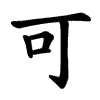可
See also: 句
| ||||||||
 | ||||||||
| ||||||||
Translingual
| Stroke order | |||
|---|---|---|---|
| Stroke order | |||
|---|---|---|---|
 | |||
Han character
可 (Kangxi radical 30, 口+2, 5 strokes, cangjie input 一弓口 (MNR), four-corner 10620, composition ⿹丁口)
Derived characters
References
- KangXi: page 172, character 12
- Dai Kanwa Jiten: character 3245
- Dae Jaweon: page 383, character 7
- Hanyu Da Zidian (first edition): volume 1, page 567, character 7
- Unihan data for U+53EF
Chinese
| simp. and trad. |
可 | |
|---|---|---|
Glyph origin
| Historical forms of the character 可 | ||||||
|---|---|---|---|---|---|---|
| Shang | Western Zhou | Spring and Autumn | Warring States | Shuowen Jiezi (compiled in Han) | Liushutong (compiled in Ming) | |
| Oracle bone script | Bronze inscriptions | Bronze inscriptions | Chu slip and silk script | Qin slip script | Small seal script | Transcribed ancient scripts |
 |
 |
 |
 |
 |
 |
 |
Characters in the same phonetic series (可) (Zhengzhang, 2003)
| Old Chinese | |
|---|---|
| 砢 | *ɡ·raːlʔ |
| 柯 | *kaːl |
| 菏 | *kaːl, *ɡaːl |
| 牁 | *kaːl |
| 滒 | *kaːl |
| 哥 | *kaːl |
| 歌 | *kaːl |
| 謌 | *kaːl |
| 鴚 | *kaːl |
| 哿 | *kaːlʔ |
| 舸 | *kaːlʔ |
| 笴 | *kaːlʔ, *kaːnʔ |
| 軻 | *kʰaːl, *kʰaːlʔ, *kʰaːls |
| 珂 | *kʰaːl |
| 可 | *kʰaːlʔ |
| 岢 | *kʰaːlʔ |
| 坷 | *kʰaːlʔ, *kʰaːls |
| 蚵 | *kʰaːls, *ɡaːl |
| 呵 | *qʰaːl, *qʰaːls |
| 訶 | *qʰaːl |
| 抲 | *qʰaːl |
| 荷 | *qʰaːls, *ɡaːl, *ɡaːlʔ |
| 何 | *ɡaːl, *ɡaːlʔ |
| 河 | *ɡaːl |
| 苛 | *ɡaːl |
| 魺 | *ɡaːl |
| 袔 | *ɡaːls |
| 阿 | *qaːl |
| 妸 | *qaːl, *qaːlʔ |
| 疴 | *qaːl, *kʰraːls |
| 鈳 | *qaːl |
| 娿 | *qaːl, *qaːlʔ |
| 痾 | *qaːl |
| 跒 | *kʰraːlʔ |
| 閜 | *qʰraːlʔ |
Phono-semantic compound (形聲, OC *kʰaːlʔ) : semantic 口 + phonetic 丂 (OC *kʰluːʔ).
Etymology 1
From Proto-Sino-Tibetan *m-kal ~ *s-gal (“back (lower); kidney; load; carry”) (STEDT). Cognate with 荷 (OC *qʰaːls, *ɡaːl, *ɡaːlʔ, “to carry”). See there for more.
Pronunciation
Definitions
可
- can; may; be able to
- to approve; to permit
- to fit; suit
- to be worth doing
- but; however
- Synonym: 可是 (kěshì)
- Particle used for emphasis.
- (archaic) Used in questions for emphasis.
- Used in rhetorical questions for emphasis.
- Used in declarative sentences for emphasis.
- Used in exclamatory sentences for emphasis.
- Used in imperative sentences for emphasis.
- (literary) about; around
- (literary) to recover completely (from an illness)
Usage notes
When Mandarin speakers wish to imitate the sound of the dialectal pronunciation of 可 in written form, the character 闊/阔 (kuò) is often used to substitute for 可.
Compounds
Derived terms from 可
|
|
|
Pronunciation
Japanese
Readings
Compounds
Compounds of 可
- Common
- 可否 (kahi)
- 可決 (kaketsu)
- 可也 (kanari)
- 可能 (kanō)
- 可愛い (kawaii)
- 可哀相 (kawaisō)
- 不可 (fuka)
- 許可 (kyoka)
- 認可 (ninka)
- Uncommon
- 可き (beki)
- 可とする (katosuru)
- 可分 (kabun)
- 可聴 (kachō)
- 可動 (kadō)
- 可読 (kadoku)
- 可逆 (kagyaku)
- 可変 (kahen)
- 可燃 (kanen)
- 可憐 (karen)
- 可算 (kasan)
- 可視 (kashi)
- 可塑 (kaso)
- 可溶 (kayō)
- 加圧性 (kātsusei)
- 可換環 (kakankan)
- 可換群 (kakangun)
- 可処分 (kashobun)
- 印可 (inka)
- 半可 (hanka)
- 裁可 (saika)
- 成る可く (narubeku)
- Archaic / rare
Noun
可 • (ka)
Korean
Vietnamese
This article is issued from Wiktionary. The text is licensed under Creative Commons - Attribution - Sharealike. Additional terms may apply for the media files.